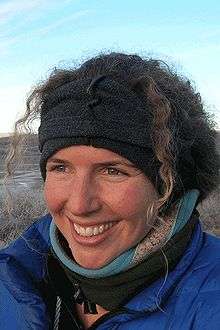Katey Walter Anthony
Katey M. Walter Anthony is an Alaskan aquatic ecologist and biogeochemist researching carbon and nutrient cycling between terrestrial and aquatic systems, and the cryosphere and atmosphere.
Katey Walter Anthony | |
|---|---|
 | |
| Nationality | American |
| Education | Mount Holyoke College University of California, Berkeley |
| Alma mater | University of Alaska |
| Known for | work on methane and carbon dioxide emissions from arctic and temperate lakes and wetlands |
| Scientific career | |
| Fields | Aquatic ecology and biogeochemistry |
Background
Walter Anthony's research focuses on methane and carbon dioxide emissions from arctic and temperate lakes and wetlands in Alaska and Siberia, and the processes involved in greenhouse gas emissions from lakes, including thermokarst (permafrost thaw), industrial plant emissions, geology, and changes in lake area. By using environmental gradients, isotopes, and remote sensing as tools, she hopes for an improved understanding of the basic processes in lake ecosystems. Many newly formed Arctic lakes have bacteria feeding on plant detritus previously frozen underground and producing methane as a waste product. Per unit of mass, methane has a more potent greenhouse effect than carbon dioxide. Global warming extrapolations could be grossly underestimated if methane contributions from lakes have not been properly studied and are not taken into account. Studies of ice cores from Greenland and Antarctica have shown that in the early Holocene Period, between 14 000 and 11 500 years ago, methane concentration in the atmosphere spiked and was from a northern source. These spikes would be cyclic, coinciding with and aggravating global warming.
Honours, awards and achievements
In March 2007 Walter Anthony was appointed the Presidential International Polar Year Postdoctoral Fellow at the University of Alaska in Fairbanks. Walter Anthony, who is fluent in Russian, works as project coordinator at Chersky for joint Russian-U.S. projects over the International Polar Year, aiming to network arctic observatories in Alaska and Russia for long term monitoring of climate change in cold regions.
Walter Anthony, who has conducted research projects in Russia, Germany, Central America and the United States, has an M.Sc in Ecology from the University of California, Berkeley with emphasis on the biogeochemistry of invasive aquatic plants. She also holds a BSc in Biogeochemistry from Mount Holyoke College.
In May 2006 she was awarded a Ph.D. in Aquatic Biology from the University of Alaska, Fairbanks. In December of the same year the United States Council of Graduate Schools recognised her outstanding work in her doctoral dissertation by awarding her the CGS/UMI Distinguished Dissertation Award in Mathematics, Physical Sciences, and Engineering. This biennial award recognises doctoral recipients who have made considerable contributions in their field.[1][2]
References
- "College of Engineering and Mines: CEM Home". www.alaska.edu. Retrieved 22 October 2017.
- "Methane Bubbling From Arctic Lakes, Now And At End Of Last Ice Age". sciencedaily.com. Retrieved 22 October 2017.